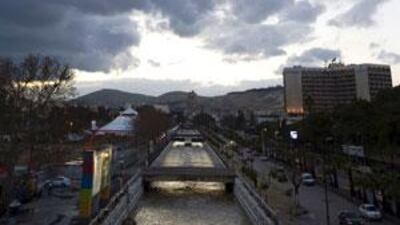DAMASCUS // For much of the past week, Syria's capital city has braced itself against freezing cold gale-force winds and an unusual deluge of rain that overwhelmed drainage systems and turned the desultory trickle of the Barada river into a torrent.
Despite the cold and wet start to the year, however, one of Syria's most pressing problems remains a severe water shortage that will, according to government and United Nations reports, only get worse as the effects of climate change strike home. In fact, torrential storm rains are one of the emerging results of global warming in Syria, scientists researching the climate here say, and do nothing to help cure the lack of water supplies.
"A study of rainfall over the past 25 years in Syria shows that the intensity is increasing, but the actual levels are either constant or, in some cases, decreasing," said Faris Asfari, an agricultural engineer who consults for the UN and who is involved in compiling a detailed report on climate change in Syria. "Increasingly the rain is torrential and that actually causes severe damage, especially to soil. It has a severe impact on the sustainability and productivity of the land; it adds to desertification problems."
Syria's ministry of state and environmental affairs compiled a position paper on climate change to coincide with last month's global conference on the issue in Copenhagen. In stark terms it said Syria already faced an environmental crisis and that the situation would further deteriorate. "Most Syrian cities are in short supply of water," the report stated." Damascus, once an oasis with a pure and ample water supply, is today one of the Middle East's thirsty cities."
Rainfall had reduced "dramatically" in the past five years, the report said, and a combination of severe drought and more frequent dust storms in the eastern region - formerly a thriving farming area - forced 300,000 people off the land. Many of them are living as internal refugees in and around Damascus. The ministry of state report said the effects of drought had been "devastating" in parts of the country and had contributed to a decline in standards of health and education.
"There is no question that one of the main challenges facing Syria over the coming years is going to be water scarcity and environmental degradation," said Yousef Meslmani, the national environmental affairs project director with the United Nations Development Programme (UNDP) in Damascus. He was critical of the outcome of the Copenhagen summit, saying such developing countries as Syria had been badly let down by the deal.
"Copenhagen might as well not have happened as far as Syria's environment is concerned," he said. "There was money allocated to help poorer nations adapt to the effects of climate change, but it was not enough and it absolutely did not tackle the underlying problem of stopping climate change." Regardless of the international community's position, Mr Meslmani said he and other experts in Syria would urge the government to take unilateral action.
"We are hoping Syria will make climate change and the environment a key national priority," he said. "It is essential we deal with these things. They represent a major challenge." The Syrian authorities stress that the failure to achieve a Middle East peace is also taking its toll, with no regional agreements on how to equitably share inadequate water resources. Syria remains at war with Israel over the Golan Heights, part of its territory that was illegally annexed in the 1980s after years of military occupation.
About 15 per cent of Israel's water supplies come from the occupied Golan, which runs up to the eastern shore of the Sea of Galilee - Israel's only freshwater lake - and includes a significant part of the Jordan River's catchment area. Control of water resources, and Israel's insistence that it retains sovereignty over the Sea of Galilee, have been one of the central sticking points in decades of failed peace talks.
Environmental scientists here also say the Syrian government bears significant responsibility for water shortages and land degradation, with decades of mismanagement, corruption and inefficiency exacerbating existing problems. Land not fit for cultivation was widely farmed in the 1980s as part of a food security policy and although it was stopped in the 1990s, severe damage - potentially permanent - was done.
Ninety per cent of Syria's water is used to irrigate farmlands and, according to one agricultural expert, it remains highly wasteful. "Irrigation systems here are only 38 per cent efficient, which means we throw away 62 per cent of all of our national water supplies before it even reaches the crops," he said. "We have irrigation channels built on soluble rock - which is the worst thing you can do - and the engineers told them it was bad idea, but they did it."
A similar situation, with one arm of government ignoring expert advice from another, arose with plans for a new industrial city north of Damascus, according to another Syrian environmental specialist. "The industrial city uses huge amounts of water in its concrete plants and so on, and it takes supplies from the same aquifer as Damascus," he explained, on condition of anonymity. "Damascus already has insufficient water so this is the last thing it needed. We told them, 'Don't do this', but they did it anyway."
Despite the litany of problems, scientists and campaigners insist there are causes for optimism. "We need an environmental revolution and that can happen," Mr Asfari, the agricultural engineer, said. "If we educate the ordinary people at a grassroots level about water, they can bring about the necessary changes. I have faith in them." psands@thenational.ae

